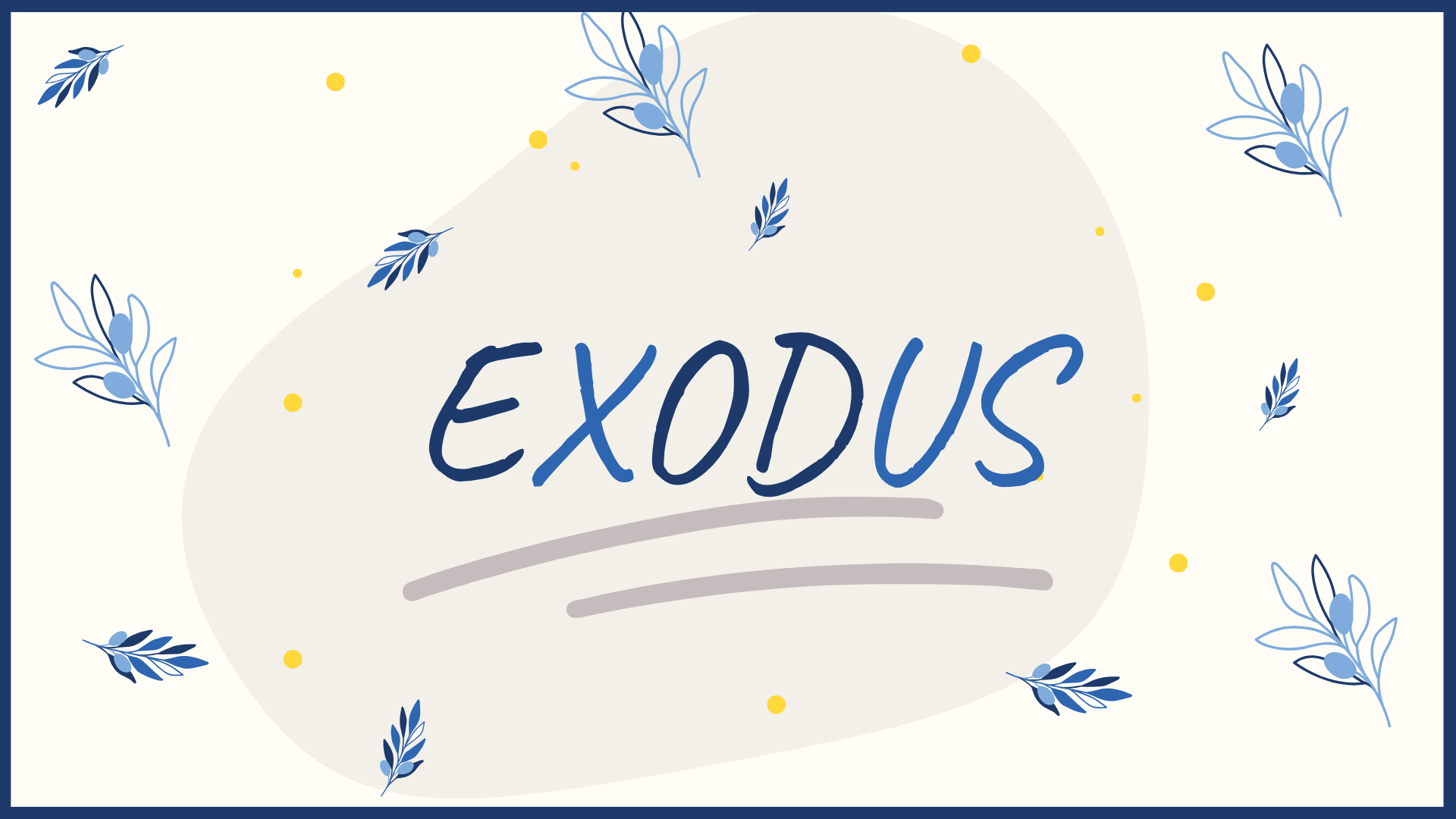
Exodus: A Quick Overview
by Milo





Follow us on social media for
FREEBIES and New Article releases.
OR
Sign Up for Our Freebie Email List and Have Freebies Delivered Directly To Your Inbox
Introduction
The Book of Exodus is the second book of the Bible and continues the historical account of the Israelites. It details their liberation from slavery in Egypt, the giving of the Law, and their journey toward the Promised Land. Exodus is central to understanding God's covenant with His people.
Authorship and Date
Traditionally, Moses is credited as the author of Exodus, as well as the other books of the Pentateuch. The events described are believed to have occurred around the 15th or 13th century BC. The book provides historical, legal, and theological insights.
Purpose and Themes
Exodus focuses on God's deliverance, the establishment of His covenant, and His presence among His people. Key themes include:
- Deliverance:
God's rescue of Israel from slavery.
- Covenant:
The giving of the Ten Commandments.
- God’s Presence:
The tabernacle as a sign of God dwelling with His people.
- Obedience:
The call to follow God's laws.
- Faithfulness:
God's commitment to His promises.
Key Verses
- Exodus 3:
"God said to Moses, 'I AM WHO I AM.'"
- Exodus 12:13
"When I see the blood, I will pass over you."
- Exodus 14:14
"The Lord will fight for you; you need only to be still."
- Exodus 20:1-3
"I am the Lord your God... You shall have no other gods before me."
- Exodus 33:14
"My Presence will go with you, and I will give you rest."
Summary of Content
Exodus can be divided into three major sections:
Chapters 1-18: Deliverance from Egypt
- The oppression of the Israelites (Chapter 1)
- God calls Moses (Chapters 2-4)
- The ten plagues and Passover (Chapters 7-12)
- The crossing of the Red Sea (Chapter 14)
Chapters 19-24: Covenant at Sinai
- The Ten Commandments (Chapter 20)
- The confirmation of God's covenant (Chapter 24)
Chapters 25-40: The Tabernacle and God's Presence
- Instructions for the Tabernacle (Chapters 25-31)
- The Golden Calf incident (Chapter 32)
- The completion of the Tabernacle (Chapter 40)
Notable Characters
- Moses:
God's chosen leader for Israel’s deliverance.
- Aaron:
Moses' brother and Israel’s first high priest.
- Pharaoh:
The Egyptian ruler who opposed Israel’s freedom.
- Miriam:
Moses’ sister and a prophetess.
- Joshua:
Moses’ assistant and later Israel’s leader.
Application and Relevance
The Book of Exodus is a powerful story of **deliverance and redemption**, showing God's faithfulness in leading His people out of slavery. It teaches that no matter how difficult our struggles may be, God is always in control and has a plan for our lives. The Israelites’ journey from Egypt to the Promised Land reminds believers that God guides and provides, even in the wilderness.
Exodus also establishes the **importance of obedience** and faith. The giving of the Ten Commandments on Mount Sinai demonstrates God’s desire for His people to live in holiness. Today, believers can apply these lessons by trusting in God's guidance, following His commandments, and relying on His provision in times of uncertainty.
Connections to Other Books
Exodus is foundational to the rest of the Bible. The theme of **redemption through the blood of the Lamb** (seen in the Passover) is later fulfilled in Jesus Christ, who is called the Lamb of God in the New Testament. The events of the Exodus foreshadow salvation, as Christ delivers believers from the slavery of sin just as Moses led Israel out of Egypt.
The **Ten Commandments** given in Exodus shape moral and legal codes throughout the Bible, including the laws in Leviticus and Deuteronomy. The themes of God's presence and guidance continue into Joshua and beyond, while the miracles and plagues demonstrate His power, setting the stage for similar divine interventions in later books.
Study Questions
- 1. How does God reveal His power in the events of Exodus?
- 2. What can we learn from Moses’ leadership?
- 3. How does the story of the burning bush apply to personal calling?
- 4. Why were the Israelites hesitant to trust God despite His miracles?
- 5. What is the significance of the Passover for Christians today?
- 6. How do the Ten Commandments shape moral values?
- 7. Why was the construction of the tabernacle important?
- 8. How do the themes of Exodus reflect in Jesus’ mission?
- 9. What role does obedience play in the life of a believer?
- 10. How does Exodus encourage us to trust God in times of difficulty?
Frequently Asked Questions
- 1. Who wrote the Book of Exodus?
Traditionally, Moses is credited as the author of Exodus, as part of the Pentateuch.
- 2. What is the main theme of Exodus?
The central theme is **deliverance**, as God rescues Israel from slavery in Egypt.
- 3. What does the name "Exodus" mean?
"Exodus" means "departure" or "going out," referring to Israel's escape from Egypt.
- 4. What is the significance of the burning bush?
The burning bush represents God’s presence and His calling of Moses to lead Israel.
- 5. Why did God send the ten plagues?
The plagues demonstrated God's power over Egypt’s false gods and forced Pharaoh to release the Israelites.
- 6. What is the Passover, and why is it important?
Passover commemorates the night God spared the Israelites from the final plague, foreshadowing Jesus as the ultimate Passover Lamb.
- 7. What happened at Mount Sinai?
God gave Moses the Ten Commandments, establishing a covenant with Israel.
- 8. How does Exodus relate to the New Testament?
Exodus foreshadows salvation through Christ, as Jesus is the ultimate deliverer.
- 9. What was the purpose of the tabernacle?
The tabernacle was a portable dwelling for God’s presence among His people.
- 10. How does Exodus end?
Exodus concludes with the construction of the tabernacle and God’s glory filling it, signifying His presence with Israel.
Daily Reading Plan
| Day |
Reading |
| Day 1 | Exodus 4-6 |
| Day 2 | Exodus 7-8 |
| Day 3 | Exodus 9-11 |
| Day 4 | Exodus 12-13 |
| Day 5 | Exodus 14-16 |
| Day 6 | Exodus 17-20 |
| Day 7 | Exodus 21-22 |
| Day 8 | Exodus 23-25 |
| Day 9 | Exodus 26-28 |
| Day 10 | Exodus 29 |
| Day 11 | Exodus 30-32 |
| Day 12 | Exodus 33-35 |
| Day 13 | Exodus 36-38 |
| Day 14 | Exodus 39-40 |

More Bible Overviews
Genesis Overview
Exodus Overview
Proverbs Overview
Ecclesiastes Overview
Isaiah Overview
Daniel Overview
Matthew Overview
Gospel of John Overview
Acts Overview
Romans Overview
1 Corinthians Overview
Revelation Overview
Freebie Offers
Sign Up for Our Freebie Email List and Have Freebies Delivered Directly To Your Inbox
Recommended Reading
Feeding Your Spiritual Growth: Best Online Bible Study Platforms
Strengthen Your Spirit: Impactful Bible Study Topics for Believers
Find Your Voice: Expressive Church Journal Prompts for Christians
Journey to Enlightenment: Best Bible Study Tools for Growth
From Busyness to Fruitfulness: A Biblical Approach to Time Management (Part 1)
From Busyness to Fruitfulness: Biblical Strategies for Effective Time Use (Part 2)
SOAP Bible Study and Other Study Methods: Which One is Right for You?
How to Use the SOAP Bible Study Method for a Deeper Walk of Faith
How to Study the Psalms Using the SOAP Method
Applying Biblical Wisdom to Financial Decision-Making
Visit Us on Pinterest









